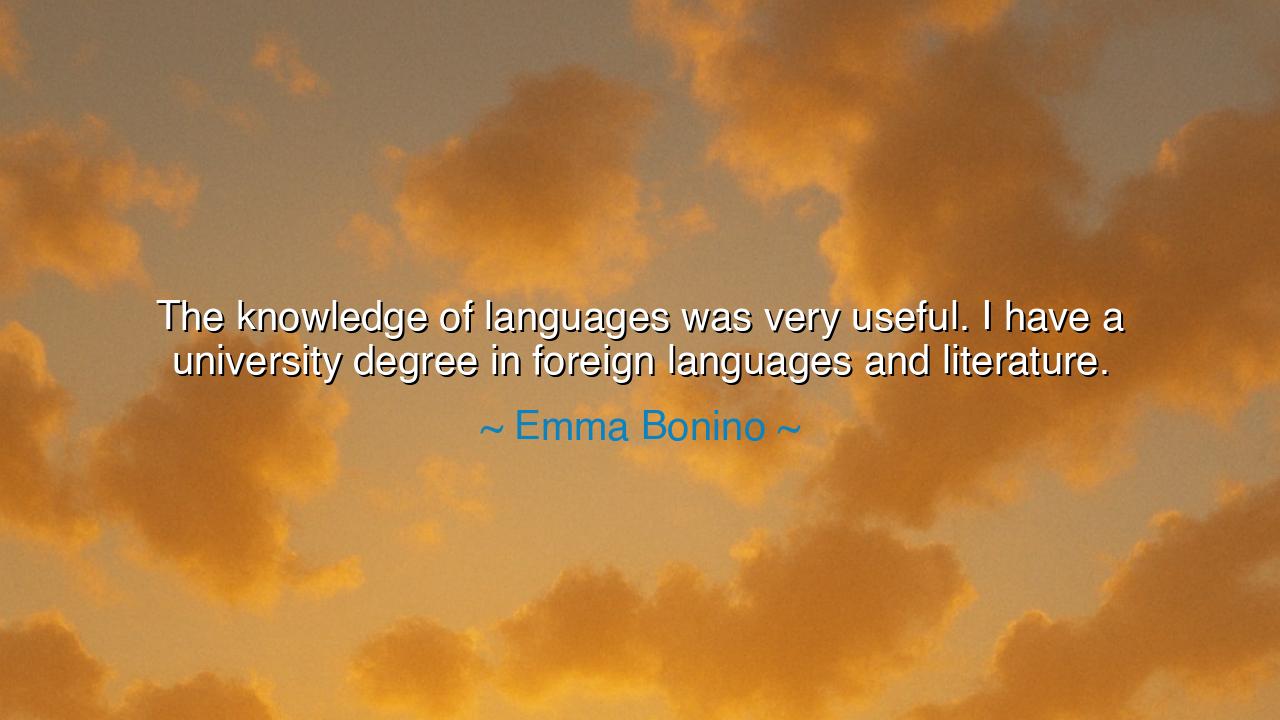
The knowledge of languages was very useful. I have a university
The knowledge of languages was very useful. I have a university degree in foreign languages and literature.






Listen, children of the world, and mark well the words of Emma Bonino, who proclaimed, "The knowledge of languages was very useful. I have a university degree in foreign languages and literature." In these words lies the ancient recognition of the power of speech, thought, and understanding, for language is no mere instrument—it is the key that unlocks the hearts, minds, and histories of humanity. To master foreign tongues is to step beyond the confines of one’s own land, to traverse the invisible bridges that connect nations, cultures, and souls.
The origin of Bonino’s insight is rooted in her own journey through the hallowed halls of learning, where the study of foreign languages and literature shaped not only her intellect but her capacity to perceive the world with nuance and empathy. A university degree, in her case, was not merely a parchment of achievement, but a vessel of power, enabling her to navigate complex societies, communicate with clarity, and engage with diverse peoples. Language became her tool, her shield, and her compass.
In the annals of history, the mastery of languages has always been a hallmark of visionaries and bridge-builders. Consider Alexander the Great, who, though a warrior by training, prized the acquisition of Persian and other tongues to govern the vast realms he conquered. Or Margaret Mead, whose fluency in native languages allowed her to understand and chronicle distant cultures with precision and respect. Like them, Bonino recognized that to know the words of another is to know their mind, their fears, their joys, and their truths.
The usefulness of languages extends beyond diplomacy or scholarship; it is the lifeblood of connection, persuasion, and influence. For Bonino, the skill opened doors to international collaboration, to advocacy, and to action in the realm of social and political change. The degree she earned symbolized not only knowledge but also preparedness—preparedness to engage with the world on its own terms, armed with understanding, sensitivity, and insight.
Yet, language is also a test of discipline and humility. It demands listening, repetition, and the patient labor of comprehension. It is a mirror in which one confronts one’s limitations, cultural biases, and assumptions. Bonino’s journey mirrors the lives of countless scholars and explorers, from Cicero, who mastered Greek and Latin to weave rhetoric with precision, to modern diplomats who traverse continents through fluency and respect. To know a language is to gain access to a civilization’s soul.
The deeper lesson, ancient in its resonance, is that knowledge is a bridge, not a barrier. A degree, while valuable, is only as powerful as the application of its teachings. Bonino’s insight reminds us that learning must serve life, and the mastery of language, like any skill, demands courage to engage, humility to listen, and creativity to communicate. Words become action, action becomes influence, and influence shapes the world.
From this, the practical guidance is clear: cultivate linguistic skills with purpose; seek to understand the voices of others, not merely to translate, but to truly comprehend; use your knowledge to foster dialogue, empathy, and collaboration; and recognize that learning is a lifelong journey, for the universe of human expression is infinite. Language, when mastered, is both a lantern in the darkness and a bridge across the chasms of misunderstanding.
In sum, Bonino’s testament is timeless: the study of foreign languages and literature is not merely academic—it is heroic, transformative, and essential. It equips the soul to move freely through the world, to touch hearts, to influence thought, and to act with wisdom. Let every word you learn become a step toward connection, understanding, and the shaping of a more harmonious and enlightened world.
If you wish, I can craft an even more epic, lyrical version, turning Bonino’s reflection into a mythic narrative about the heroism of knowledge and the power of language, ideal for audio narration. Do you want me to do that?






AAdministratorAdministrator
Welcome, honored guests. Please leave a comment, we will respond soon